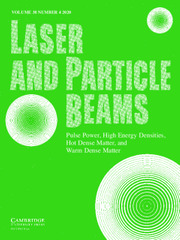Crossref Citations
This article has been cited by the following publications. This list is generated based on data provided by
Crossref.
Gupta, N K
and
Godwal, B K
2002.
Effects of non-local thermodynamic equilibrium conditions on numerical simulations of inertial confinement fusion plasmas.
Pramana,
Vol. 59,
Issue. 1,
p.
33.
Yan, Jun
and
Wu, Ze-Qing
2002.
Theoretical investigation of the increase in the Rosseland mean opacity for hot dense mixtures.
Physical Review E,
Vol. 65,
Issue. 6,
Chakera, J. A.
Arora, V.
Sailaja, S.
Kumbhare, S. R.
Naik, P. A.
Gupta, P. D.
Gupta, N. K.
and
Godwal, B. K.
2003.
Dependence of soft x-ray conversion on atomic composition in laser produced plasma of gold–copper mix-Z targets.
Applied Physics Letters,
Vol. 83,
Issue. 1,
p.
27.
Arora, V.
Chakera, J. A.
Naik, P. A.
Kumbhare, S. R.
Gupta, P. D.
and
Gupta, N. K.
2006.
Effect of gold on keV x-ray emission yield from laser produced plasma of gold-copper mix-Z targets.
Journal of Applied Physics,
Vol. 100,
Issue. 3,
Dhareshwar, L
and
Chaurasia, S
2008.
Laser plasma interaction in solid metal, mixed metal alloy and metal nano-particle coated targets.
Journal of Physics: Conference Series,
Vol. 112,
Issue. 3,
p.
032050.
Chaurasia, S.
Munda, D. S.
Murali, C. G.
Gupta, N. K.
and
Dhareshwar, L. J.
2008.
X-ray and ion measurements in laser produced plasma from gold-copper alloy targets.
Journal of Applied Physics,
Vol. 103,
Issue. 1,
Chaurasia, S.
Dhareshwar, L. J.
and
Gupta, N. K.
2008.
Ion dynamics in laser-produced plasmas from mixed high-Z targets.
Radiation Effects and Defects in Solids,
Vol. 163,
Issue. 4-6,
p.
381.
Chaurasia, S
Munda, D S
Tripathi, S
Kumar, M
Gupta, N K
Dhareshwar, L J
and
Bajaj, P N
2010.
X-ray emission from Au-Sm alloy target irradiated with high power sub nanosecond laser.
Journal of Physics: Conference Series,
Vol. 208,
Issue. ,
p.
012093.
Mendoza, M.A.
Rubiano, J.G.
Gil, J.M.
Rodríguez, R.
Florido, R.
Martel, P.
and
Mínguez, E.
2011.
A new set of relativistic screening constants for the screened hydrogenic model.
High Energy Density Physics,
Vol. 7,
Issue. 3,
p.
169.
Wagenaars, E.
Whittaker, D.S.
and
Tallents, G.J.
2011.
A method to probe Rosseland and Planck mean opacities with high-order harmonics.
High Energy Density Physics,
Vol. 7,
Issue. 1,
p.
17.
Zhao, Yiqing
Lan, Ke
Song, Peng
Zheng, Wudi
and
Li, Xin
2012.
A method to determine the flux limiter via the motion of the M-band emission region in Au hohlraum.
Laser and Particle Beams,
Vol. 30,
Issue. 3,
p.
387.
Matsuura, Yuta
Kaku, Masanori
and
Kubodera, Shoichi
2013.
Enhancement of extreme ultraviolet radiations from a laser-produced plasma using copper–tungsten alloy.
Applied Physics B,
Vol. 110,
Issue. 3,
p.
397.
Mahdieh, Mohammad Hossein
and
Hosseinzadeh, Sahar
2013.
Numerical study of radiative opacity for carbon and aluminum plasmas produced by high power pulsed lasers.
Laser and Particle Beams,
Vol. 31,
Issue. 2,
p.
273.
Naik, P.A.
Arora, V.
Prasad, Y.B.S.R.
Chakera, J.A.
and
Gupta, P.D.
2017.
Materials Under Extreme Conditions.
p.
501.
Mishra, Gaurav
Ghosh, Karabi
Ray, Aditi
and
Gupta, N.K.
2018.
Wide range scaling laws for radiation driven shock speed, wall albedo and ablation parameters for high-Z materials.
High Energy Density Physics,
Vol. 27,
Issue. ,
p.
1.
Mishra, Gaurav
and
Ghosh, Karabi
2019.
Investigation of various methods for wall loss reduction in Inertial Confinement Fusion hohlraums.
High Energy Density Physics,
Vol. 33,
Issue. ,
p.
100714.
Mishra, Gaurav
and
Ghosh, Karabi
2022.
Detailed investigation on x-ray emission from laser-driven high-Z foils in a wide intensity range: Role of conversion layer and re-emission zone.
Physics of Plasmas,
Vol. 29,
Issue. 9,

